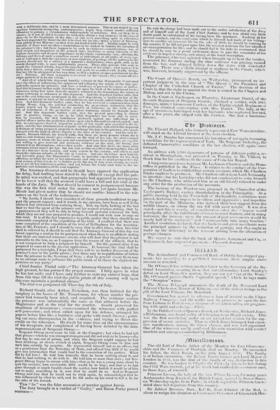Richard Could, alias Arthur Nicholson, was then indicted for the
burglary in the house of' Mr. Templetnan, for whose murder the pri- soner had formerly been tried, and acquitted. The evidence against the prisoner was substantially the same as that adduced before the Magistrates and at the trial for the murder. Gould preserved his steadiness of demeanour ; cross-examined the witnesses with perfect self-possession ; and when called upon for his defence, arranged his papers before him like a barrister, and spoke with mach fluency ; point- ing out some discrepancies in the evidence, and trying to throw dis- credit on the witnesses. lie dwelt for some time on the circumstances of his recapture, and complained of having been deluded by the false representations of Sergeant Otway- Sergeant Otway never came to him at the Comptes; but when he had left thatprison—when he was amongst strangers and did not wish to be known—the first day he was out of prison, and when the Sergeant might suppose he had been di:1111(1ms at eleven o'clock at night, Sergeant Otway came to her and took him entirely by surprise. Ile represented himself not as an officer, but as a gentleman Irons the Secretary of State, and offered him 21)01. if he would give any ;affirmation that would lead to the conviction of the parties. What did he tell him ? De told him honestly that he knew nothing about it, and that he had nothing to do with it. Ile told him so more than once ; but Ser- geant Otway began to reason with him—that as lie was a young man, about to quit the country, how serviceable 2001. would be to hint ; and that us lie had gone through so much trouble about the matter, how foolish it would be of him not to make something by it, now that he could do so. And as Sergeant Otway told him that he could not lie tried again, he acknowledged that he was influenced by what he said, and he did make up his mind to tell a lie for the sake of the reward.
This "lie" was the false accusation of murder against Jarvis.
The Jury brought in a verdict of " Guilty," and Baron Parke passed sentence— Ile said the charge had heels made out to the entire satisfaction of' the Jury and of himself and of the Lord Chief Justice; and he was afraid very little doubt could be entertained of his having been the murderer. Looking at his general conduct, and the confession which he himself had made of his willing- ness to sacrifice an innocent life for the sake of 2004, he should be wanting to the country if he did not pass upon him the severest sentence the law admitted of—transportation for life; and he should feel it his duty to recommend that he should be sent to a penal settlement, there to pass the remainder of his existence its hopeless slavery, and misery of the worst description.
The prisoner, who was agitated when brought up to hear the verdict, recovered his firmness during the time sentence was passing, turned from the bar, and skipped lightly down the stairs with wonderful, alacrity. There was a slight attempt at applause in the Court ; which was, however, instantly suppressed by the officers.


























 Previous page
Previous page